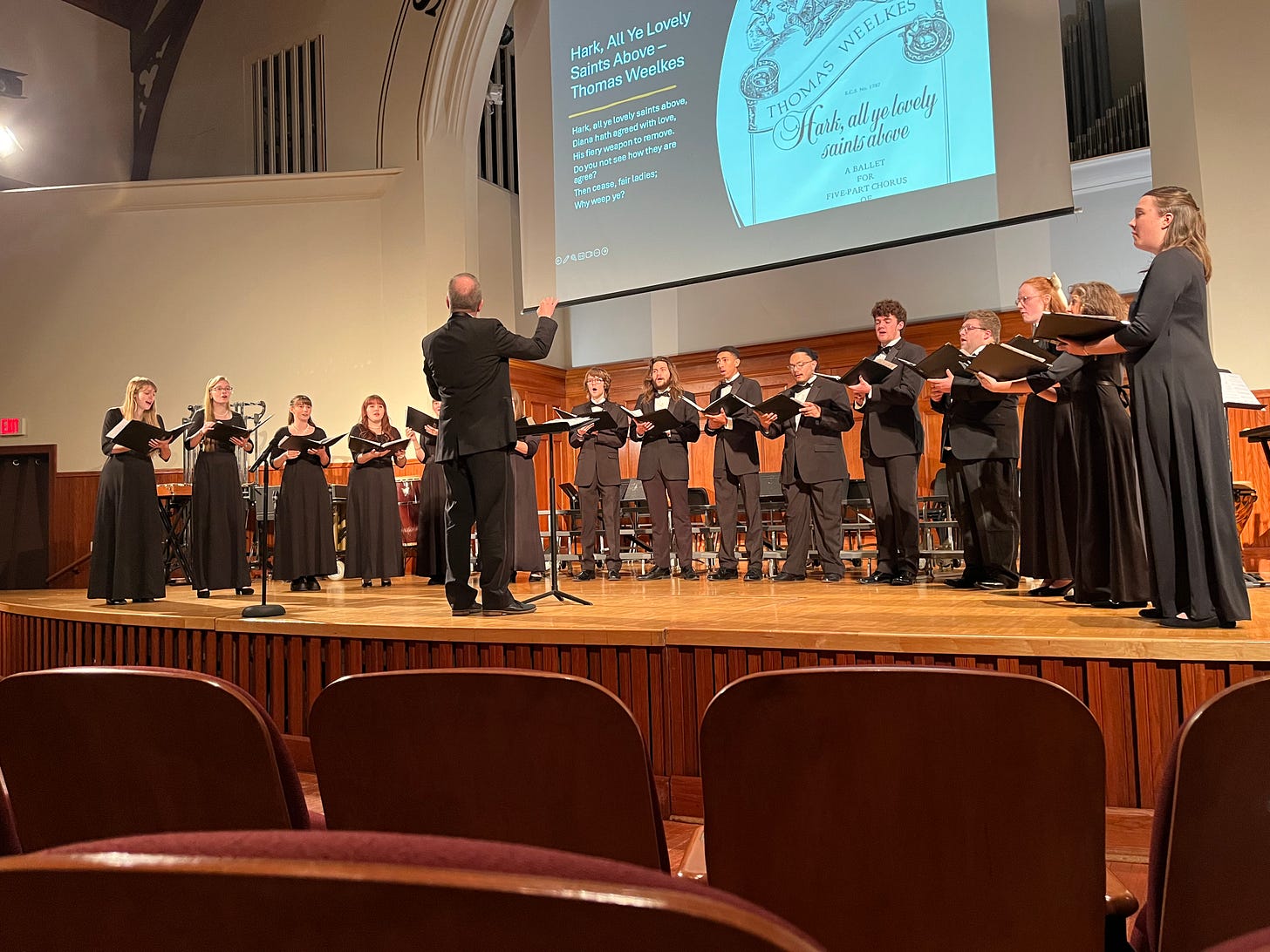Over spring break, Monmouth’s Chamber Winds and Chorale flew to Greece to perform and enjoyed the sites and culture. They performed their returning home concert in Dahl Chapel, showcasing music sets they performed in Greece.
The concert kicked off with a performance from the Chamber Winds. When introducing the night’s program, Dr. Justin J. Swearinger said, “The idea was kind of a bookmarks, postcards, passport to the world.” Their program contained songs from various parts of the world. They started the night with “Lift Every Voice and Sing” by J. Rosamond Johnson. Dr. Swearinger called the song a “very important part song in American culture.”
They performed “Constellations” by Monmouth College alum Sean Klink. Afterward, they traveled to the British Isles for “Fantasia of the Dargason” by Gustav Holst. “Fantasia of the Dargason” is a dance song where the audience is supposed to imagine a bear chasing after the dancers. Next, Chamber Winds performed a Japanese medley by Joe Hisaishi from Studio Ghibli’s movie My Neighbor Totoro.
They moved on to Brazil for “Danse Brasileira” by Ricardo Silva. This song mimics music from Carnival celebrations. Coincidentally, Carnival celebrations were happening in Greece during their trip. They ended their segment finished with “Sogno di Volare” by “an Asian-American composer but very much with an Italian title” Christopher Tin.
The Chamber Choir performed four songs, “Hark, All Ye Lovely Saints Above” by Thomas Weelkes, “Northern Lights” by Ola Gjeilo, “Old Friends” by Paul Simon (of Simon and Garfunkel), and “Ilus Hääl” by Margrit Kits. They sang beautifully in acapella. Translations of lyrics were projected on a big screen above the performers.
During the transition between Chamber Choir and Chorale, Corey Pevitz, a member of Chorale, spoke about the trip and his experience. Pevitz said, “We performed in three different locations, [at] three different audiences who spoke pretty much no English. But one of the hosts of one of the venues that we performed at talked about music being a universal language. How music goes beyond words, and it goes strictly to meanings and shared meanings. Shared meanings of humanity. And there’s something beautiful about this collectivistic ideal. That all of us, regardless of where we’re born, [or] what languages we speak, we can all share some sort of happiness and joy. One of my favorite memories from Greece was us performing at the Athens School of Music in Athens, Greece, and the children being so excited just to share their music with us and for us to be heard. And there’s something very special about that experience that can’t be replicated in any other place unless you’re international and you experience these other cultures, and you interact with them, and you partake in them. There’s something very special about that.”
The Chorale started their segment with “Domine Deus” by David Caldarella. They sang “Bach (Again): Come, Sweet Death” by Johan Sebastian Bach afterward. For “Bach (Again): Come, Sweet Death,” they sang normally in the first half, except in the second half, everyone sang at different paces accompanied by movements.
They sang “Eldorado” by Andrej Makor. The song’s lyrics came from an Edgar Allan Poe poem where an old knight tries to find the lost city of Eldorado. The knight meets a shade who points him towards Eldorado or maybe his death. The next song was “We Can Mend the Sky” by Jake Runestad. This piece came from a poem about the civil war in Somalia and the feelings and memories of the writer.
Next was “When We Love” by Elaine Hagengerg, followed by “Sigalagala” by Luo Spirituial. Inviting anyone who knew the song to join them on stage, the Chorale ended the night with “A Flame of White and Crimson.”
Kiersten Fuhr Contributing Writer


